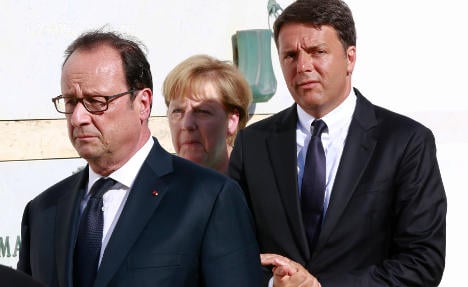“Many thought the EU was finished after Brexit but that is not how it is,” Renzi said as he welcomed the leaders for France and Germany for crucial talks on how to revive the European project in the wake of the Brexit shock.
“We want to write a better page (in European history).”
Calling out the continent's eurosceptics, he said it was “easy to complain and find scapegoats.”
The EU “is the answer” to Europe's problems, for it cemented “peace, prosperity and freedom,” he said.
German Chancellor Angela Merkel recalled that the EU had been born from some of the “darkest moments” of European history, a reference to the Second World War.
Echoing Renzi, she said the time had come to “write a better page” in European history.
French President Francois Hollande warned that Europe was faced with a risk of “fragmentation and division.”
It needed a “new impulse” on three fronts, Hollande said: the economy; defence and security; and ensuring jobs and education opportunities for young people.
The three leaders were speaking ahead of a working dinner aboard the Italian aircraft carrier Giuseppi Garibaldi as the sun set over the Naples coast.
Road map
In a symbolic move, the Italian PM earlier took his guests to the grave of Altiero Spinelli, a founding father of the ideal of European integration.
Renzi called the meeting in a bid to forge a common position on the EU's future ahead of a summit of the 27 remaining states in Bratislava on September 16th.
Europe's economic outlook, jihadist attacks, the refugee and migrant drama, the Syrian conflict, and relations with Russia and Turkey were also expected to be covered.
The Brexit vote has raised fears of similar referendums in other countries, particularly the Netherlands, which opposes changes to the EU to achieve closer integration.
But coming up with a road map acceptable to all will not be easy.
The Czech Republic, Hungary, Poland and Slovakia vowed after Britain's vote to draw up their own plans for a less centralised EU.
The Ventotene trip was the start of an intensive tour for Merkel as she attempts to coordinate a response to one of the EU's biggest crises in decades and quell fears Berlin wants to monopolise the debate.
Cooperation, flexibility
Renzi, who is campaigning for greater flexibility on EU deficit rules to help his flagging economy, said “we need strong measures to relaunch growth and fight youth unemployment”.
In a show of support, Merkel praised Renzi's “Jobs Act” reform and said the Stability Pact “has quite a lot of flexibility that we can use in a clever way”.
Creating jobs “means creating conditions for private investment to have a chance”, she said.
Hollande called for an EU investment fund for infrastructure, education, research and innovation to be beefed up.
All three leaders have been hit in the polls by varying toxic combinations of refugee crisis, economic slump and terror attacks, with eurosceptic or populist parties gaining ground.
Their room for manoeuvre is restricted. Next year will see a general election in Germany and presidential and legislative elections in France.
After a series of deadly attacks by the Islamic State group, the three leaders were also expected to explore greater co-operation on counter-terrorism and an integrated European security and defence policy – a cherished objective that some analysts say could be easier to achieve after sceptical Britain departs.
“In light of Islamic terrorism and the civil war in Syria, we have to do more to ensure our security. We should increase cooperation on matters of defence and the sharing of intelligence,” Merkel said.




 Please whitelist us to continue reading.
Please whitelist us to continue reading.
Member comments